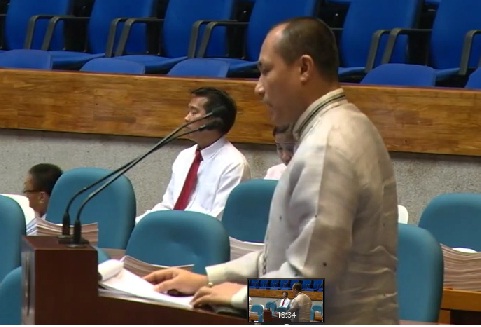No one was surprised that the Supreme Court junked the petition questioning the legality of the Bangsamoro Basic Law which was still being deliberated by both chambers of Congress when it adjourned sine die last June 11.
The BBL missed its timetable of the Senate and House of Representatives passing it by June 11.
Supporters of the legislation which promises lasting peace for Muslim Filipinos and the country are hopeful that the resumption of the deliberations on the bill after President Aquino’s last State of the Nation Address on July 17 would lead to bill’s eventual passage into a law.
When that time comes, more groups will be questioning it before the Supreme Court.
Before the adjournment of the House of Representatives, Magdalo Representative Gary Alejano raised valid issues during the interpellation of Antipolo Rep. Romeo Acop, one of the vice chairs Hoc Committee on the Bangsamoro Basic Law.
Alejano, who was detained for seven years for his participation in what is known as the Oakwood Mutiny” was a captain in the Philippine Marines. He spent most of his tours of duty in Bangsamoro areas like Lanao del Sur, Maguindanao, Basilan, and Sulu.
In short, he has seen realities on the ground.
“The issue of peace process is very sensitive to me because it is the ordinary soldiers and ordinary Filipinos who suffer in this long-drawn war in Mindanao, Pilipino laban sa Pilipino. It is, therefore, our advocacy in Magdalo to find solutions for a lasting peace in Mindanao,” Alejano said.
Alejano is a member of the Ad Hoc Committee on Bangsamoro Basic Law; Special Committee on Peace, Reconciliation and Unity; and of the Committee on National Defense and Security.
Alejano raised five concerns on the BBL bill that they were deliberating on:
First, compelling reasons why Autonomous Region in Muslim Mindanao has to be abolished;
Second, the questionable role of Malaysia as mediator to the GPH-MILF peace process;
Third, the trustworthiness of the group that the government is negotiating with, in this case, the MILF;
Fourth, the negotiation, per se, in the events leading up to the signing of the peace agreements;
Fifth, the arrangement that would be implemented after the signing of House Bill No. 5811 into law.
Due to space constraints, I’ll focus on Alejano’s concern about the role of Malaysia in the negotiation considering that the Philippines and Malaysia have unresolved territorial claims over Sabah.
Alejano said it was the Moro Islamic Liberation Front, with whom the government is engaged in a peace process with the BBL as implementing legislation that wanted Malaysia as the broker.
Here’s a portion of Alejano’s interpellation:
“As far as I remember, it is not the government of the Republic of the Philippines who requested for Malaysia. It was MILF. The government of the Republic of the Philippines would have wanted other countries, neutral, independent, disinterested, because we know that we have a standing claim to Sabah. But because the MILF insisted for Malaysia, the government gave in.
“Malaysia’s role is inherently questionable for being in a state of conflict of interest. Political support for rebel movements disqualifies one from becoming an intermediary or intercessor for rebels who come to the negotiating table. The fact is that it was Malaysia who, through the decades, supported, trained and gave sanctuary to rebel leaders and the rebel movement in Mindanao. It was the Malaysian government who funded, trained and provided sanctuary to the MNLF since its inception, to the detriment of the Filipino people, until rebel groups signed a peace agreement with the government.
“It is a known fact that aside from being a supply and communication center for Moro rebels in the ‘60s and ‘70s, Malaysia regularly held paramilitary training for these rebels in Sabah. This was government-sponsored. When the MILF suffered heavy losses in combat, MILF leaders such as Sheikh Salamat Hashim would seek refuge in Malaysia and under the Malaysian government’s support. Adding to an already clear conflict of interest is that Malaysia is very much aware of the Philippines’ standing claim to Sabah. Malaysia’s claim is diametrically opposed to the interest of the Philippine government. When Misuari and MNLF pledged support to the Sultanate of Sulu in claiming back Sabah, it is interesting to see that Malaysia dropped all the support to MNLF.
“Aside from the MNLF, the Sultanate of Sulu was sidelined as well in the GPH-MILF peace talks. It would not be too remote to say that Malaysian support to the MILF was in exchange for the latter to drop or stay silent on the Sabah claim.”
Alejano’s concern has found basis in the self-abasing attitude of the Aquino government to Malaysia.
Last March, Malaysian Foreign Minister Datuk Seri Anifah Aman arrogantly said there is no Philippine claim on Sabah when asked for his reaction on VERA Files story on the proposal of the Aquino government to withdraw a 2009 protest to Malaysia on Sabah in exchange for a declaration related to Spratlys that would bolster Philippine case against China.
Anifah said, “Is there a claim? We have never recognised any claim (by the Philippines on Sabah.)”
The Aquino government did not protest Anifah’s arrogant statement.
The Sultan of Sulu, citizens of the Philippines, has title over huge part of timber and mineral rich Sabah, formerly North Borneo, which covers 22 percent of the Malaysia total area.
Amina Razul, whose family is a member of the Sultanate of Sulu said they have been receiving more than 50 years from the Malaysian government “5,000 ringgit (P62,600) a month.”
